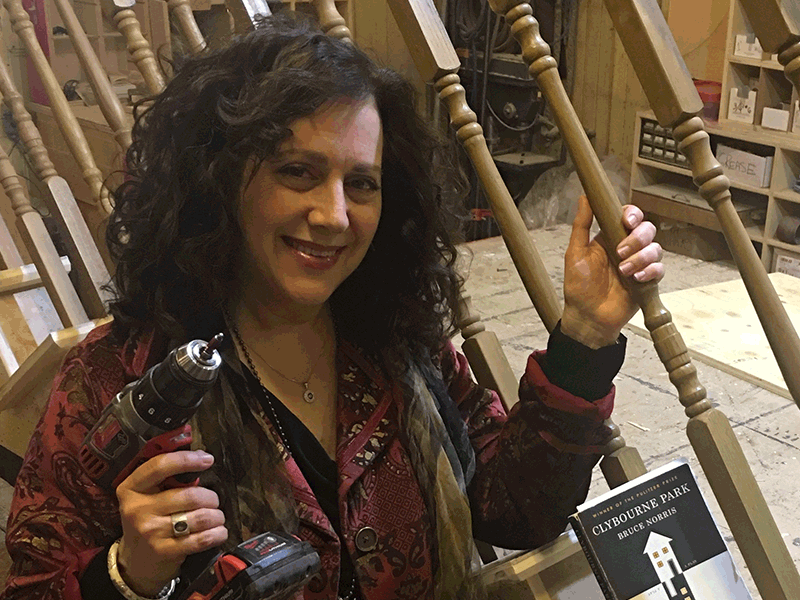Ellen David picks up a drill in the workshop where the set for Clybourne Park is being built to illustrate a point.
“I use art as my tool. Theatre inspires the hope for social change. It’s not attempting to preach at anybody but to open up a conversation that people need to have,” says the director of Bruce Norris’ scathing satire onstage at Centaur Theatre April 4 to 30.
The conversation inspired by the Pulitzer Prize-winning play is around how the age-old need for a place to live can foul interracial relations, a situation that reproduces itself from the West Bank to our own borders.
In Norris’ play, inspired by Lorraine Hansberry’s A Raisin in the Sun, Chicago is the microcosm and the focal site is the house at 406 Clybourne Street.
Raisin was about a black family set to move into a white neighbourhood and the havoc it raises. This one explores what happens to the house in the years that follow.
The play’s two acts are divided between 1959 and 2009, the first dedicated to the black Younger family aiming to live their American dream in a white neighbourhood and the second act revealing how the house has fallen into decline over the 50 years following, which represented a period of urban decay for a variety of reasons.
“Now it’s been sold to a white couple who want to raze it to the ground and build a mansion against the wishes of blacks on the housing board. They are suburbanites wanting to be near downtown as the neighbourhood is becoming desirable again,” explains David.
“It’s happening in Montreal with our own Griffintown, where the Centaur rehearsal space is a hold-out. Who profits from gentrification when one group is pushed out? For the playwright, it’s about territory, who owns it and who wants it.
“That’s where all the other ‘isms’ like racism come in because when different races and different groups of people move into those neighbourhoods, how do they change it? We think we’re way past issues of racism and sexism but they still rear their ugly heads.”
The play accomplishes its shaming through laughter as the politically incorrect lines fly to their mark and amuse audiences despite themselves.
“The characters are trying to be very politically correct but the layers of the onion peel away and you get to see what people are really thinking and they really go for it,” the director says.
“Maybe there was hope in 2009 when [former U.S. president Barack] Obama came in, but I think we’ve gone backwards. Things that seem to be resolved are still very prominent as we enter the era of ‘make America hate again.’ What motivates hatred is fear. Fear of losing ground, fear of losing what one has, fear of the other.”
A cast of seven including Matthew Gagnon, Marcel Jeannin, Liana Montoro, Lisa Bronwyn Moore, Eleanor Noble, Kwasi Songui and Harry Standjofski play different characters from one act to the next.
“It’s also very moving, about real people, families, parents, children,” David says. “We all want the same things: a place to live, a good life. That’s what unites us. This play explores what divides us and why we’re not on the same page about a lot of things.”
Set and costume designer Michael Eagan has wrought a miracle in the transformation of the disputed house from era to era and lighting designer Guy Simard meets the challenge of its letterbox-shaped presentation. David has also ensured a smooth transition over the 50-year gap between acts through a musical intermission that whisks us forward.
“It’s risky territory to expose people’s inner selves like this but this is a play that will open a dialogue,” she says.
Tickets to Clybourne Park are at 514-288-3161.
